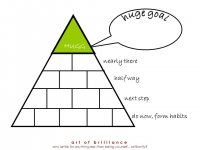Right now, my practice sessions are really random. Sometimes I will play through all the songs that I know, mistakes and all. Sometimes, I will take 10 minutes to work out a tricky passage. Sometimes, I will decide to learn a new tune. Sometimes I stop what I'm doing altogether and move on to other randomness. It got me thinking that I really need to have a routine.
When I was playing double bass in the orchestra, my routine was very structured, and it was similar most days.
-Warm up with scales and arpeggios. I would switch it up. Play in 3rds. Play across the strings in each position, etc. I would also incorporate different bowing variations.
-Work through progressive etudes making sure to have some thumb position work involved.
-Play through orchestral excepts.
-Play through the current performance repertoire. Whatever was on the upcoming program
-Sight reading.
-Work on a solo piece. Dragonetti Concerto or Eccles Sonata.
This really helped me to be more a more rounded player. I wasn't going to audition for the NY Philarmonic, but I was always prepared for the rehearsals and the concerts. Really, the whole routine is based on an actual audition. There would be an excerpt section, a slight reading section and a solo section. A lot of professional orchestras post their audition requirements and it was really interesting to look at them. They list the specific excerpts and solos. At other points in my musical endeavors, I would switch up the routine to focus on my musical goals, but a lot of it was similar. For example, when I was playing jazz, I still needed to warm up, practice etudes and sight reading, etc.
So, do you have a standard practice routine? What is it? And why do you think it is helpful?
When I was playing double bass in the orchestra, my routine was very structured, and it was similar most days.
-Warm up with scales and arpeggios. I would switch it up. Play in 3rds. Play across the strings in each position, etc. I would also incorporate different bowing variations.
-Work through progressive etudes making sure to have some thumb position work involved.
-Play through orchestral excepts.
-Play through the current performance repertoire. Whatever was on the upcoming program
-Sight reading.
-Work on a solo piece. Dragonetti Concerto or Eccles Sonata.
This really helped me to be more a more rounded player. I wasn't going to audition for the NY Philarmonic, but I was always prepared for the rehearsals and the concerts. Really, the whole routine is based on an actual audition. There would be an excerpt section, a slight reading section and a solo section. A lot of professional orchestras post their audition requirements and it was really interesting to look at them. They list the specific excerpts and solos. At other points in my musical endeavors, I would switch up the routine to focus on my musical goals, but a lot of it was similar. For example, when I was playing jazz, I still needed to warm up, practice etudes and sight reading, etc.
So, do you have a standard practice routine? What is it? And why do you think it is helpful?

